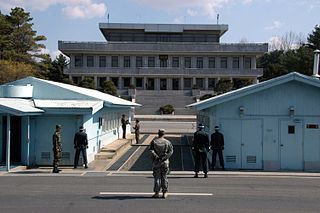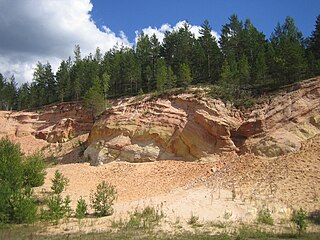
The Korean Demilitarized Zone is a strip of land running across the Korean Peninsula near the 38th parallel north. The demilitarized zone (DMZ) is a border barrier that divides the Korean Peninsula roughly in half. It was established to serve as a buffer zone between the countries of North and South Korea under the provisions of the Korean Armistice Agreement in 1953, an agreement between North Korea, China and the United Nations Command.

Pakistan Navy Atlantic shootdown incident happened on 10 August 1999, when a Breguet Atlantic maritime patrol aircraft of the Pakistan Naval Air Arm was shot down by a MiG 21 fighter of the Indian Air Force over the Rann of Kutch, on the border between India and Pakistan. The episode took place just a month after the Kargil War, aggravating already tense relations between the two countries.

Border Incident is a 1949 film noir directed by Anthony Mann. The MGM film was written by John C. Higgins and George Zuckerman. The film was shot by cinematographer John Alton, who used shadows and lighting effects to involve an audience despite the fact that the film was shot on a low budget. The drama features Ricardo Montalbán, George Murphy, Howard Da Silva, among others.

The 2001 Bangladesh–India border clashes were a series of armed skirmishes between India and Bangladesh in April 2001. The clashes took place between troops of the Bangladesh Rifles (BDR) and the Indian Border Security Force (BSF) on the poorly-marked international border between the two countries.

On the morning of March 6, 2008, an unknown individual placed a small bomb in front of a United States Armed Forces recruiting station in Times Square, located in Midtown Manhattan in New York City. There were no injuries. A security camera shows the bomber riding a bicycle as he approaches the station, dismounting the bike and planting the bomb, and then speeding off shortly before the blast.

Islām Qala, known historically as Kafir Qala, is a border town in the western Herat province of Afghanistan, near the Afghanistan–Iran border. It is the official entry by land from neighboring Taybad, Iran.

Piusa is a village in Võru Parish, Võru County, in southeastern Estonia. It is located on the left bank of the river Piusa, near the border of Russia.
The 2011 India–Pakistan border skirmish was a series of incidents which took place during the months of July and August 2011 across the Line of Control in Kupwara District and Neelam Valley. Both countries gave different accounts of the incident, each accusing the other of initiating the hostilities.

The 2011 NATO attack in Pakistan was a border skirmish that occurred when United States-led NATO forces engaged Pakistani security forces at two Pakistani military checkposts along the Afghanistan–Pakistan border on 26 November 2011, with both sides later claiming that the other had fired first. Two NATO Apache helicopters, an AC-130 gunship and two F-15E Eagle fighter jets entered as little as 200 metres (660 ft) to up to 2.5 kilometres (1.6 mi) into the Pakistani border area of Salala at 2 a.m. local time. They came from across the border in Afghanistan and opened or returned fire at two Pakistani border patrol check-posts, killing 28 Pakistani soldiers and wounding 12 others. This attack resulted in a deterioration of relations between Pakistan and the United States. The Pakistani public reacted with protests all over the country and the government took measures adversely affecting the American exit strategy from Afghanistan, including the evacuation of Shamsi Airfield and closure of the NATO supply line in Pakistan.
The 2012 Nuevo Laredo massacres were a series of mass murder attacks between the allied Sinaloa Cartel and Gulf Cartel against Los Zetas in the border city of Nuevo Laredo, Tamaulipas, across the U.S.-Mexico border from Laredo, Texas. The drug-violence in Nuevo Laredo began back in 2003, when the city was controlled by the Gulf Cartel. Most media reports that write about the Mexican Drug War, however, point to 2006 as the start of the drug war. That year is a convenient historical marker because that's when Felipe Calderón took office and carried out an aggressive approach against the cartels. But authors like Ioan Grillo and Sylvia Longmire note that Mexico's drug war actually began at the end of Vicente Fox's administration in 2004, when the first major battle took place in Nuevo Laredo between the Sinaloa Cartel and Los Zetas, who at that time worked as the armed wing of the Gulf Cartel.

The 2013 India–Pakistan border incidents was a series of armed skirmishes along the Line of Control (LoC) in the disputed Kashmir area. Starting from the mid-January 2013, they have been described as the "worst bout of fighting in the region in nearly 10 years". It began on 6 January 2013, when according to Pakistani reports Indian forces attacked a Pakistani border post, killing one soldier. Indian authorities claimed the incident as a retaliation against preceding Pakistani ceasefire violations, but denied having crossed the demarcation line. In a second skirmish on 8 January, Indian authorities said that Pakistani forces crossed the LoC, killing two Indian soldiers. The incident sparked outrage in India and harsh reactions by the Indian army and government over the news that the body of one of the soldiers had been beheaded. Pakistan denied these reports. On 15 January, a third skirmish reportedly led to the death of another Pakistani soldier.
The Akashat ambush was a well planned assault against an unarmed Syrian Army convoy defended by Iraqi soldiers that took place on 4 March 2013, as the group was travelling in the province of Anbar, next to the border with Syria. The Islamic State of Iraq claimed responsibility for the ambush on 11 March 2013.

The 2013 Depsang standoff, also called 2013 Depsang incursion, or 2013 Daulat Beg Oldi incident, was an incursion and sit-in by a platoon-sized contingent of the Chinese PLA at the mouth of Depsang Bulge, 30 km south of Daulat Beg Oldi near the Line of Actual Control in the disputed Aksai Chin region. Indian forces responded to the Chinese presence by quickly establishing their own encampment 300 metres (980 ft) away. Negotiations between China and India lasted nearly three weeks, during which the Chinese position was supplied by trucks and supported by helicopters. The dispute was resolved on 5 May, after which both sides withdrew. As part of the resolution, the Indian military agreed to dismantle some military structures 250 km away in the Chumar sector, which the Chinese perceived as threatening. The Chinese military in July 2014 acknowledged the incursion at the Depsang Valley in Ladakh region and said that such incidents occurred due to differing perceptions of the Line of Actual Control.

Jordanian–Syrian border incidents during the Syrian Civil War refers to violent incidents on the arid 379 km (235 mi) Jordan–Syria border over the course of the Syrian Civil War.

The spillover of the Syrian Civil War was the impact of the Syrian Civil War in the Arab world and beyond. Since the first protests during the Arab Spring, the increasingly violent Syrian Civil War has been both a proxy war for the major Middle Eastern powers, Turkey and Iran, and a potential launching point for a wider regional war. Fears of the latter were realized when the Islamic State of Iraq and the Levant (ISIL), a Salafi Jihadist militant group and alleged former al-Qaeda affiliate, established itself in Syria in 2013, and later combined with the War in Iraq (2013–2017) into a single conflict the following year. The spillover of the Syrian Civil War is often dubbed the Arab Winter.
2016–present clashes in West Iran refers to the ongoing military clashes between Kurdish insurgent party Democratic Party of Iranian Kurdistan (PDKI) and the Iranian Revolutionary Guards, which began in April 2016. Kurdistan Freedom Party (PAK) and Komalah expressed their support to the Kurdish cause of PDKI as well, with both clashing with Iranian security forces in 2016 and 2017 respectively. In parallel, a leftist Iranian Kurdish rebel group PJAK resumed military activities against Iran in 2016, following a long period of stalemate.
A photomultiplier is a device that converts incident photons into an electrical signal.
The Hezbollah–Israel conflict is part of the Israeli–Lebanese conflict as well as the Iran–Israel proxy conflict.











